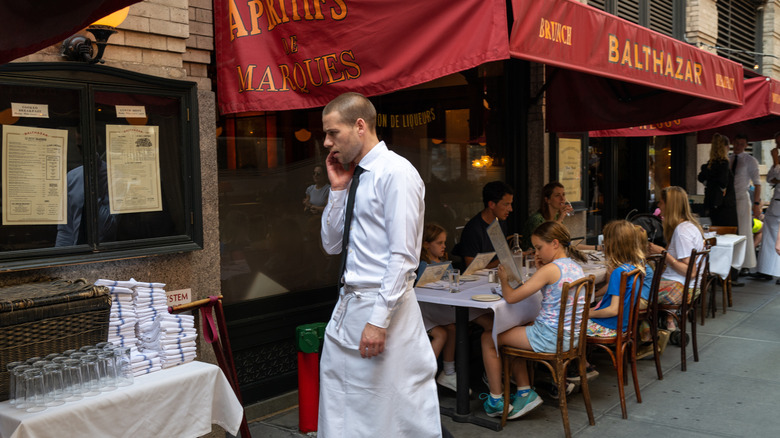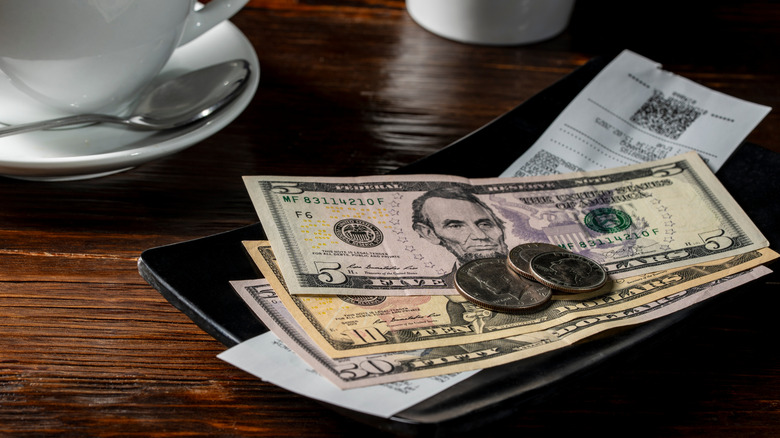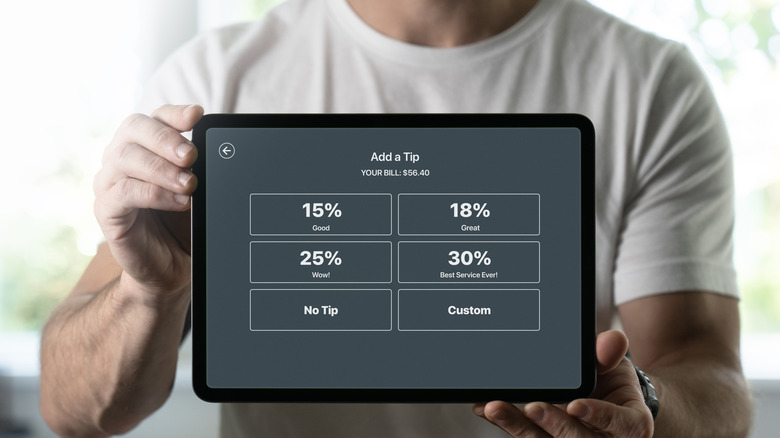The New Tax Law That Could Change Restaurant Tipping Forever
Donald Trump had promised to eliminate taxes on tips if he was elected to a second non-consecutive term as president, causing tipping to become a flash point in the 2024 election. Trump was elected, and taxes on tips were reduced — but not fully eliminated. Under Section 70201 of Trump's championed One Big Beautiful Bill Act (OBBBA), hospitality employees must still report tips. They must also still pay their Social Security and Medicare taxes on the tip earnings, since the bill only amends the income tax portion of the Internal Revenue Code (IRC) and doesn't apply to employment taxes. However, servers, baristas and bartenders earning $150,000 or less can deduct up to $25,000 for qualified tips for their federal income tax, even if they take the standard deduction. The amount is reduced by $100 for every $1,000 earned over the $150,000 threshold.
Yet, there is a catch. Per the OBBBA, the tip income does not qualify for the deduction unless "...such amount is paid voluntarily without any consequence in the event of nonpayment, is not the subject of negotiation, and is determined by the payor." This means that the tips must be voluntary, and mandatory gratuities that restaurants sometimes impose on customers aren't eligible for the so-called "no tax on tips" deduction. As a result, restaurant operators may consider making another change to tipping culture for restaurant workers by ending mandatory gratuities altogether, CBNC reported.
And it will be quite a shift. According to the National Restaurant Association (via CNBC), 54% of full-service operators sometimes add an automatic gratuity to all checks. And of those that add a gratuity charge, 88% only do it when the dining party exceeds a certain number of people, usually six. The remaining 12% add the fee automatically to all bills.
Here's why restaurants add gratuities and why the IRS doesn't count them as tips
Automatic gratuities ensure that hospitality staff whose salary largely depends on tips receive some compensation, according to digital menu provider Menu Tiger. And they're typically added to tables with a lot of people, which entail a lot of work for servers, per point-of-sale provider Toast.
However, the IRC and various state laws classify automatic gratuities as service fees, not tips. The reason for this is that the customer isn't given a chance to determine how much of a tip they will give. So, the service fee is treated as a regular salary. And that regular salary isn't eligible for any qualified tip deductions.
This means that a system that was put in place by restaurant operators to make sure servers don't get short-changed could now have a negative impact on their take-home pay. "... Those servers would likely consider it a disadvantage to forego $25,000 of tax-free income when they could potentially move to a restaurant that does not utilize service charges and are therefore eligible for tax-free tips up to $25,000," a spokesperson for The Florida Restaurant and Lodging Association said, via CNBC.
For a tip to count as one, customers must be given a clear choice
Keeping their restaurant talent would certainly motivate restaurant owners to scrap automatic gratuity charges. That would mean allowing customers the unrestricted ability to leave whatever tip they want. According to the IRS, a gratuity left on a bill that provides customers tip calculations of say, 15%, 18%, and 20%, but has a blank line that allows them to pick any amount — or none at — would count as a "tip." That's because this approach allows customers to choose how much to tip their bartender, server, or barista.
For now, many restaurant owners are waiting to see if there will be any rule changes to the new tip tax deduction provision. And there are efforts to get the IRS to change its mind. For example, Nevada's two senators and three congressional representatives sent a letter to Treasury Secretary Scott Bessent in August 2025 pleading that automatic gratuities be counted as qualified tips because there is no difference between the two for employees. Yet, for now, the language of the OBBBA, and the IRC section it amends, outlines a clear difference between automatic gratuities and qualified tips.


